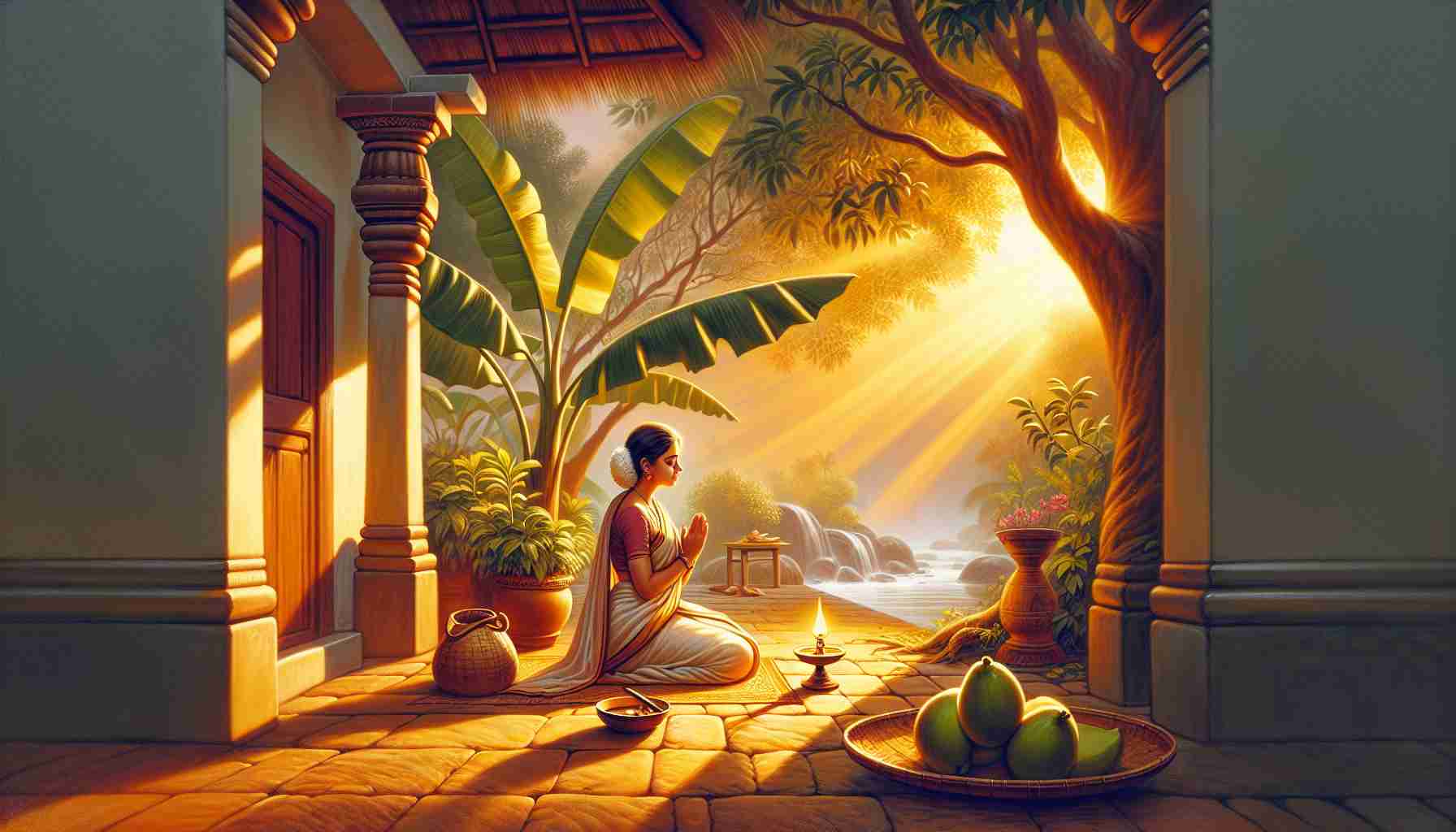

I am Leela, a schoolteacher from a small village near the sacred Kaveri river. I’m known for always being calm, for speaking softly and keeping my faith strong. But let me tell you the story of when I almost let go—and what I learned about the Divine hold that never lets go of us.
My husband, Arvind, was a simple farmer. One day, in a sudden turn of fate, he collapsed in the field. The doctors in town said his heart had given way. Just like that—he was gone. I remember standing at the cremation ground with his ashes cooling in the early morning breeze, thinking, “What now? What do You want from me now?”
Even as I walked through the days after, tying my sari in the dark so the children wouldn’t see me cry, I said my morning prayers. I whispered the Gayatri Mantra I had recited since I was five. But truthfully, I was only going through motions. My faith felt hollow, like eating without tasting.
One morning, I lit a diya—an oil lamp—for Arvind on the edge of our courtyard, by the tulsi plant. The flame flickered wildly in the wind. I was about to shade it with my hand when it suddenly died. That tiny flame … it felt like my last bit of strength.
I looked at the empty lamp and said aloud, “I can’t. I can’t carry this alone.”
And I didn’t expect an answer. But I remembered a line then—one I hadn't read in years:
“sarva-dharmān parityajya mām ekaṁ śaraṇaṁ vraja”
—“Abandon all duties and surrender to Me alone.” (Bhagavad Gita 18.66)
Something softened in me. The Gita wasn’t calling me to fix everything. Krishna, protector and teacher from the great Mahabharata war, wasn’t asking me to be strong. He was asking me to surrender.
So I folded my hands.
I whispered, “Okay. Then You carry it.”
That afternoon, my neighbor’s little boy came holding a guava. “For you, Leela-akka,” he said, eyes shy. “Amma said you’re lonely.” It wasn’t grand. Just a fruit from a small hand. But it filled the space where pain had sat for weeks.
Day by day, I began to notice more — the wind playing in the banana trees, a cow nuzzling her calf, an extra chapati from the school cook tucked into my tiffin. These weren’t miracles. But they spoke. Quietly.
The Katha Upanishad says, “The Self is not known through study or instruction, but by him whom the Self chooses—he alone perceives It.” Perhaps that day, as I let go of trying to make sense of pain, I became quiet enough to be chosen.
Now I know—surrender isn’t weakness.
It’s trust.
And trust means believing that even when our hands are tired, we are still held.
Just as Arjuna stood confused, bow slack in the great battlefield, and Krishna did not leave him—so too, the Divine has never let go of me.
Not once.
I am Leela, a schoolteacher from a small village near the sacred Kaveri river. I’m known for always being calm, for speaking softly and keeping my faith strong. But let me tell you the story of when I almost let go—and what I learned about the Divine hold that never lets go of us.
My husband, Arvind, was a simple farmer. One day, in a sudden turn of fate, he collapsed in the field. The doctors in town said his heart had given way. Just like that—he was gone. I remember standing at the cremation ground with his ashes cooling in the early morning breeze, thinking, “What now? What do You want from me now?”
Even as I walked through the days after, tying my sari in the dark so the children wouldn’t see me cry, I said my morning prayers. I whispered the Gayatri Mantra I had recited since I was five. But truthfully, I was only going through motions. My faith felt hollow, like eating without tasting.
One morning, I lit a diya—an oil lamp—for Arvind on the edge of our courtyard, by the tulsi plant. The flame flickered wildly in the wind. I was about to shade it with my hand when it suddenly died. That tiny flame … it felt like my last bit of strength.
I looked at the empty lamp and said aloud, “I can’t. I can’t carry this alone.”
And I didn’t expect an answer. But I remembered a line then—one I hadn't read in years:
“sarva-dharmān parityajya mām ekaṁ śaraṇaṁ vraja”
—“Abandon all duties and surrender to Me alone.” (Bhagavad Gita 18.66)
Something softened in me. The Gita wasn’t calling me to fix everything. Krishna, protector and teacher from the great Mahabharata war, wasn’t asking me to be strong. He was asking me to surrender.
So I folded my hands.
I whispered, “Okay. Then You carry it.”
That afternoon, my neighbor’s little boy came holding a guava. “For you, Leela-akka,” he said, eyes shy. “Amma said you’re lonely.” It wasn’t grand. Just a fruit from a small hand. But it filled the space where pain had sat for weeks.
Day by day, I began to notice more — the wind playing in the banana trees, a cow nuzzling her calf, an extra chapati from the school cook tucked into my tiffin. These weren’t miracles. But they spoke. Quietly.
The Katha Upanishad says, “The Self is not known through study or instruction, but by him whom the Self chooses—he alone perceives It.” Perhaps that day, as I let go of trying to make sense of pain, I became quiet enough to be chosen.
Now I know—surrender isn’t weakness.
It’s trust.
And trust means believing that even when our hands are tired, we are still held.
Just as Arjuna stood confused, bow slack in the great battlefield, and Krishna did not leave him—so too, the Divine has never let go of me.
Not once.